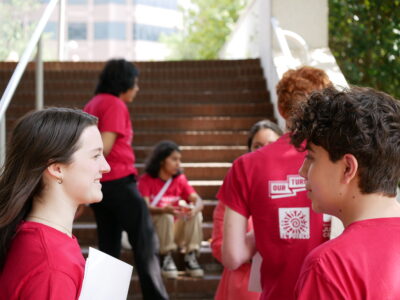
|
|
Editor’s Note: In February 2024, Our Turn launched a campaign for an audit of discipline practices in the Charlotte-Mecklenburg Schools (CMS). An email about the campaign said, “In order to pursue a more just student discipline practice and policy, we need to know what is currently happening in our schools. What are the current discipline practices at each school? What are their impacts on students? How do these practices impact students across lines of race, gender, socio-economic status, disability status, and more?”
This perspective is written by a student leader in Our Turn. Kayla Morais, the chief growth officer of Our Turn, serves on the board of EducationNC.
Imagine a school system where every student’s voice is not only heard but valued and holds true power in shaping disciplinary practices.
A recent report by the Southern Coalition for Social Justice says, “Across North Carolina’s 115 school districts, this year’s data shows worse disparities experienced by Black students as compared with white students when it comes to receiving short-term suspensions and being referred to the juvenile justice system than at any time since the COVID pandemic.”
In February 2024, CMS released a report noting that while the district is striving for the out-of-school disproportionality rate for Black students to fall to 23 percent by 2024, “the district is on track to miss that goal by nearly six point three percentage points.”
Here is what is clear to me. If we want a more equitable school district, discipline is an issue that must be addressed.
CMS, which serves about 140,000 students across the city of Charlotte, has an opportunity to drastically improve its disciplinary practices by involving those most affected — the students themselves. A student-centered discipline audit is necessary to ensure fair and effective discipline within our schools by first assessing the current practices and inequities across the district.
This audit should not only analyze current practices and suspension data, but also include direct input from students who experience these policies firsthand. By centering the lived experiences of those closest to the problem, we can create solutions that are equitable and just.
It is students who have this firsthand experience that can answer questions like:
What are the social and emotional impacts of these policies?
How does it feel to be removed from class?
What types of practices disrupt the classroom?
What types of discipline feel productive or nurturing to students?
It’s time for our school board to not only listen, but use students’ voices and experiences in crafting solutions that directly impact them, and we need the Charlotte community to join us in urging the school board to require a student discipline audit that includes direct input from students.
Students are not just recipients of disciplinary measures.
— Jordan Montgomery
We are active participants in the educational community whose voices deserve to be heard.
Research has consistently shown that involving students in decision-making processes can lead to more effective and equitable outcomes in education. A study published in the Journal of School Health found that student involvement in school governance positively correlates with improved academic achievement, school climate, and student behavior. 1
Involving students in the audit process can help uncover and address the way these disparities happen in the classroom and school environment, helping to discover underlying issues and inform more holistic and student-centered approaches to discipline.
By actively engaging students in the audit process, CMS can tap into their unique insights and experiences, enriching the evaluation of disciplinary practices and fostering a sense of ownership and responsibility among students.
As I approach graduation, I have realized that the largest challenge I faced in the education system has been discipline.
With only a few weeks until graduation, I remember how many days and weeks I was “punished” for misbehavior by a disciplinary code that was not only damaging but discriminatory.
Every year from third grade to seventh grade, I felt targeted for insubordination, willful disobedience, and talking back. This changed my enjoyment of school.
Our Turn’s campaign advocates for student voices to be heard in disciplinary audits so that we learn from students like me rather than isolating and ostracizing them.
We cannot forget student voices, and we cannot forget their experience. I want students to be heard and listened to.
— Jordan Montogomery
As we navigate the complexities of disciplinary practices in CMS, it’s clear that meaningful change requires collective action and advocacy.
We urge all stakeholders — students, parents, educators, administrators, and community members — to join us in advocating for equitable student discipline in CMS.
One of the most immediate ways to support our cause is by signing our petition for equitable student discipline. By adding your name to our petition, you lend your voice to the call for a comprehensive discipline audit that incorporates direct input from students and addresses systemic disparities in disciplinary outcomes.
Let’s stand together to create a school environment where all students feel valued, respected, and empowered to succeed.




